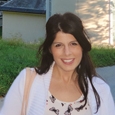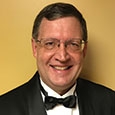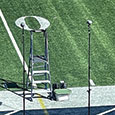After winning the piccolo fellowship to the Aspen Music Festival and School, Nicole Esposito wanted to play piccolo in a symphony orchestra. She soon discovered an even greater passion for teaching. She is now the flute professor at The University of Iowa and one of the youngest tenured associate flute professors in the United States. Her career includes work as a soloist, teacher, and chamber and orchestral musician. She has performed in the United States, Europe, and Central and South America, including at ten NFA Conventions, as well as many regional conferences and flute festivals.
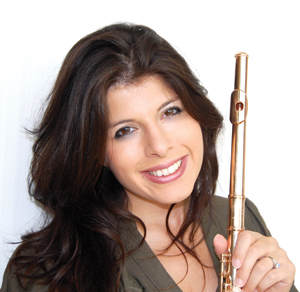 How did you become interested in the flute?
How did you become interested in the flute?
Growing up in a small town in the beautiful Berkshire mountains of western Massachusetts, I did not have as much access to top-level players and musical organizations as students from the bigger cities. I was never very much into the social scene in high school, and the flute really became my outlet. My parents, who are non-musicians, never had to tell me to practice; they had to tell me to stop. After my first flute teacher moved away, I took lessons with a new teacher who lived about an hour away. It was not a successful year, and I became very discouraged. A chance meeting between my father and the concertmaster of the Boston Symphony led to a lesson with Fenwick Smith at Tanglewood. Smith recommended several wonderful teachers in the Boston area. My home was nearly three hours by car to Boston, but my parents decided that if I was serious about it, they would drive me to Boston for lessons.
I studied for one wonderful year with Catherine Payne, who currently plays piccolo with the San Francisco Symphony. Payne won the job in San Francisco a year after I began studying with her, but thankfully she sent me to study with Marianne Gedigian. Having Gedigian as a teacher in high school was exactly what I needed. I had the drive and determination to do well, but my skills were perhaps slightly behind. She taught me so much about the basic qualities of flute playing, but more importantly, about phrasing and musicality.
While studying with her, I auditioned for the Boston University Tanglewood Institute. I spent the summer at Tanglewood taking Doriot Anthony Dwyer’s flute classes, and I played in the BUTI Young Artists Orchestra. Anyone who has been to Tanglewood knows that it is a sort of a Shangri la for budding classical musicians. It was a tremendous education in itself to hear the Boston Symphony play so many different programs with almost every major soloist when I was just sixteen.
How did you select Carnegie Mellon for your Bachelor’s degree?
When it was time to begin the daunting experiencing of auditioning for music schools, I set my sights on Jeanne Baxtresser as a teacher. At the time, she taught at the Juilliard School and Manhattan School of Music. I was worried that I would not be able to get in either place. One day, my mother picked up my new issue of Flute Talk, and there was an advertisement for Carnegie Mellon University stating that Baxtresser would be joining the faculty. I immediately called to schedule an audition. When it came time for the audition, there was a mishap and it never happened. I was crushed.
Fortunately, I was able to arrange a lesson with Baxtresser in New York. When I arrived, I saw a student leaving the lesson who had recently won a big competition, and I became very nervous, thinking, “I am probably here wasting her time, why would she be interested in me?” She was incredibly welcoming, and my nerves began to ease. I played the Mozart G Major Concerto and the opening solo of Debussy’s Faun. Baxtresser asked me a few questions and then asked me to play a low A natural with and then without vibrato. Then she looked at me and said, “Honey, would you like to be my student at Carnegie Mellon?” I was stunned. From that moment, my life was changed.
What stands out from your college years?
In my freshman year at Carnegie Mellon, I probably was not prepared for the rigors of college life, both academically and socially. In addition to lessons with Baxtresser, I also had the incredible opportunity of studying with Alberto Almarza and Jennifer Conner. I think I was a bit overwhelmed at first by it all and was not working up to my potential. With the first semester behind me, I decided to get my act together and not waste this incredible opportunity. From that moment on, I woke up every day at 4:30 a.m. to practice. I played until classes started and picked up again after they ended.
Lessons with Baxtresser were magical. The gentle quality of her voice and her enchanting flute sound captivated me. I lived for the moment in a lesson when she said “Good job honey.” She taught us to work diligently on basic skills, and how to apply them to making music. We learned a wide range of repertoire while working on tone, color, vibrato, line, articulation and technical prowess. It was her goal that we would learn to work independently, and I am so thankful for this training.
How did you come to participate in the Aspen Music Festival?
I always had a special affinity for the piccolo, and Baxtresser encouraged me to enter the school concerto competition with the Liebermann Piccolo Concerto. I did, and much to my surprise, I won. She also encouraged me to send in a recording for the piccolo fellowship at the Aspen Music Festival. The recording was due within days, so I scrambled to record the required material and sent it off with little expectation. A few weeks later, I was surprised to receive a call from Aspen, asking me to be the piccolo fellow.
My first concert at Aspen was Mahler’s 2nd Symphony, which of course has a major piccolo solo. The concert was an important event because it was the grand opening of the festival’s new outdoor concert hall. Mark Sparks was playing first flute. The wind section was filled with players from major orchestras, and there was a well-known conductor on the podium. I was twenty years old and terrified. I held my own on that first concert and with each additional performance throughout the summer, I became increasingly confident. I especially enjoyed working with Mark Sparks. He provided great insight in lessons and was the perfect model of an excellent orchestral flutist.
At the end of the summer I left Aspen determined to become an orchestral piccolo player. When I returned to school, I definitely neglected the flute a bit, and it started to show. I did however have to prepare for graduate school auditions, so I made sure my flute playing was in good enough shape to be ready. I auditioned for two graduate schools and was accepted at both and decided to study at the University of Michigan, and Ann Arbor became my new home.
What were your experiences studying at the University of Michigan?
Early in my first semester at Michigan, Amy Porter, my new teacher, gave a recital. From the moment she walked on stage and played her first notes, I sat up in my chair and thought to myself, “Oh, that’s how it is supposed to be.” I was completely in awe of her command of the instrument, but most of all her command of the stage. I had never seen anything like it. I knew I needed to buckle-down with my flute playing and think on a larger scale. I wanted to learn as much as possible. I also wanted to impress her, so I would often bring in four Paganini Caprices a lesson, or learn a new concerto every week.
I played a lot of piccolo at the University of Michigan, but I also played principal flute on many orchestra concerts so I regained confidence in my flute playing. Upon graduation, I won the principal flute position with the Dubuque Symphony Orchestra in Iowa. During this time I re-examined the fundamentals of my playing. I finally had the time to absorb everything from my schooling, and I would say that my playing improved the most in this year. I entered several important competitions, doing fairly well, and winning some prizes. I helped to start a flute club in Iowa and served as the first president. I started giving recitals at local and regional venues. I also discovered that I enjoyed writing about the flute and published a few articles. In the summer I taught flute at the Interlochen Arts Camp.
While at Interlochen, I discovered how passionate I was about teaching. I had given private lessons for years, but the atmosphere and playing level at Interlochen were extremely exciting. I found myself invigorated when students made improvements, and it made me want to improve my own playing as well. I also noticed that I was gesturing and speaking in ways similar to how Baxtresser taught me, and I realized just how big of an impression my teachers made on me. I wanted to see if I could have such as positive effect on someone’s life.
How did you become the flute professor at the University of Iowa?
In the summer of 2006, the flute position at the University of Iowa became available and a search was held for a one-year term. I applied knowing that it was a bit of a stretch, but I had amassed considerable professional experience in several areas. I was interviewed for the job and was chosen as a finalist but did not win the position.
Gro Sandvik from the Bergen Academy in Norway came to teach in Iowa City that year and she became a wonderful friend. Gro was not interested in the permanent position and intended to return to Norway. I knew that they would soon be searching again for a full-time tenure-track teacher, and I was determined to show the committee that I had what it took to lead a flute studio at a major university. That year I taught in an adjunct position at a university, published articles, and gave national and international performances and masterclasses. When it came time to apply again for the Iowa job, I was ready.
Seven years have now passed, and I recently received tenure and promotion to associate professor of flute. Having this job has been a dream come true. Although initially I thought that I wanted to play piccolo in an orchestra, I realized that all I really wanted was to achieve excellence and even more to watch excellence being achieved.
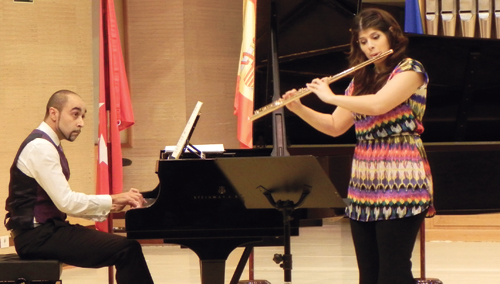
What is your teaching philosophy?
Teaching at a large public university offers the opportunity to work with a variety of students with a broad range of majors, goals and interests.
In addition to teaching graduate students, a large amount of my class is filled with undergraduates majoring in performance, education and music therapy, and many have double majors.
I work with the students rigorously on the fundamentals of their playing, specifically sound, articulation, intonation, rhythm, and phrasing. I stress the difference between general warm-ups, preparing to play for that day, and conscious daily exercises, that help to build strength and long term-success. We do a lot of etudes in my studio, and students often learn, depending on their degree level, between 20-50 etudes per semester. I teach etudes, not only for technical purposes, but to learn to guide technique with a musical intention and gesture.
I encourage students to ask themselves questions in lessons, as they should be doing in their own practice. Sometimes I switch roles, and I become the student and they the teacher. When they are forced to look within, they are often surprised that they already know the answers. The weekly studio class is primarily performance based but I often ask a student to take over the class to learn how to be an effective teacher. I strive to teach students the difference between expression and musicality, and that performers must understand what the music is doing. I teach a class on orchestral excerpts and audition strategies as well as coaching flute ensembles and chamber music.
My expectations are always extremely clear, however I leave the curriculum open ended based on a student’s degree program, experience, and career goals. Each semester students bring me a refreshed repertoire list so we can check whether it is balanced and determine if they are learning enough repertoire throughout the various genres. I tend to teach concepts and do not spoon feed stylistic elements. I want students to think for themselves so that their approach to learning goes beyond a specific piece. I teach more to the long-term than the short-term, however I aim to find a balance that keeps them moving forward every week.
How do you switch from flute to piccolo and how you teach this?
There are many approaches to the physical switch from flute to piccolo, and players tend to focus on this. We have to know the small differences between the instruments to make the necessary adjustments. I personally do not believe that the piccolo, or alto flute for that matter, is a completely different instrument.
I think of the flute family like a piano. There is one basic technique to play the instrument; you just have to slightly adjust at times to manage the highest and lowest octaves. In teaching I focus more on the mental, rather than physical switch. If someone is using a flexible enough embouchure on flute, there should not be too many problems transitioning to piccolo. We have to see the instrument as a vehicle for making music. I often ask students to play flute pieces that they already know well on piccolo, so the musical intent is guiding their technique rather than the other way around. If you are seriously interested in playing piccolo well, you have to incorporate it into your basic daily exercise routine, switching back and forth between the two instruments.
Why did you start the Iowa Piccolo Intensive?
In 2011 after adjusting to life in academia, I decided to incorporate my love for the piccolo into my university activities in a bigger way. I organized a summer workshop, the Iowa Piccolo Intensive, as way to encourage young piccolo players, train them for auditions, and help advance the repertoire for the instrument. One thing I stressed was that this class was not only about tips for piccolo playing, but simply how to be a great musician, no matter which instrument you play. I perform on both flute and piccolo on my recitals there. I want the participants to understand that although they may love playing the piccolo, they have to be equally capable of playing the flute.
Each year I do a masterclass titled Spin that Phrase that specifically focuses on line and phrasing. We work primarily with the Marcel Moyse 24 Small Melodic Studies. I utilize passages that allow students to simplify things harmonically or rhythmically so that the expression coincides with the gesture of the music. In this class I teach students how to find what is simple in the music, even if the notation is complex. We work with the Moyse to identify basic phrasing, and then I have them simplify other melodic or even technical passages, so the structure of the meter and harmonic motion is clear.
I like to think of the structure of a phrase as being similar to the construction of a house. Though each house has different shapes, dimensions, and decorations, they all have floors, ceilings, and walls. There is as much commonality to every house as there is difference. The structure of music, especially within a certain era or time period, is often very similar; it is just decorated differently by various notes, rhythms and key centers. Comprehension and communication of music has to eventually transcend the notation.
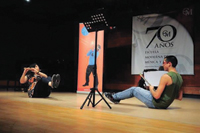 What do you do in your spare time?
What do you do in your spare time?
When I am not teaching and or fulfilling academic responsibilities at the University of Iowa, I enjoy traveling for masterclasses and performances as well as for leisure. One of the biggest reasons I love being a musician is the element of collaboration and communication. I love languages and try to perfect those I speak in my spare time. I am particularly comfortable with Spanish and Portuguese, so I enjoy traveling to countries where they are spoken. I always try to teach classes in the native language of the country because the inflection and musicality of the language can influence the meaning and impact of the message.
I strive to set the best example possible for my students, not only through my playing, but as a person. In the end I do not care if my students go on to be the world’s best flute players. If that is what they want, of course I will help them get there. It is more important, however, to cultivate caring, respectful, open-minded, thinking, hard-working contributors to culture, society, and humanity. If they choose to do this as flutists, I will be thrilled. I am grateful to the flute for giving me the opportunity to come in contact with amazing students and players from all over world. If I could give one bit of advice to aspiring young professionals it would be to seize every opportunity, large or small, that may come your way. If the opportunities do not come to you, look for ways to create your own. Find your voice and let it speak loudly and clearly.
* * *
Can I Spin that Phrase?
Interpretation of music, just as in spoken language, is a skill that must be cultivated with intuition, information and intelligence. To make sure that your expressive gestures coincide with the harmonic and rhythmic architecture of the music, ask yourself the following twenty questions:
1. Can I identify the phrase?
2. Does the phrase have a structure?
3. How many bars is the phrase?
4. Am I demonstrating the meter clearly?
5. Have I identified inner phrasings or nuances within the larger phrase?
6. Can I find the high and low points of the phrase?
7. Do I understand the harmony, counterpoint, or voicing?
8. Have I planned my breaths for necessity?
9. Have I planned my breaths in a musical way?
10. Is my sound consistent in quality throughout the phrase?
11. Have I utilized my broadest dynamic range necessary required to play the passage?
12. Have I thought about which tone colors to use when, where, and why?
13. Have I thought about how my vibrato supports or enhances the line?
14. Is my expression appropriate to the style and time period of the music?
15. Have I tried practicing the entire phrase on one single pitch?
16. Have I tried practicing the pitches only with a neutral rhythm?
17. Have I sung, clapped or even danced the phrase?
18. Have I listened to multiple recordings of the piece (if available) or other works by
the composer?
19. Have I studied the full score?
20. Have I left room for spontaneity and inspiration?
